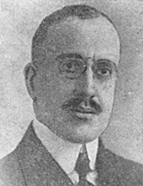

Domingos Maurício suggests that, while Ferrão devoted himself to pedagogy and the theory of history, he did so “without much success” (VELBEC, vol. 8, 1969, p. 625). Regarding the first subject, this evaluation remains to be conducted, partly due to personal circumstances that prevented the individual in question from working as a professor at the Faculdade de Letras de Lisboa, despite being qualified through public examination and having reportedly been invited to teach at similar institutions in France and Switzerland (António Ferrão, Curriculum Vitae, 1935, p. 5, n. 2).
Indirectly, A. Ferrão considered the civic and moral role of academies, particularly after the First World War, to be decisive. He expressed this view in As Causas «Ideais» da Conflagração e a Função Pedagógica das Academias Científicas após a Guerra [The 'Ideal' Causes of the Conflagration and the Pedagogical Role of Scientific Academies after the War] (1918), where he invoked Teófilo Braga as president of the Academia das Ciências de Portugal. As a lecturer, an official in the Ministry of Public Instruction, and a theorist on the importance of universities, academies, cinema, and theatre for popular education, Ferrão seemed to make a constant effort to investigate the root causes of wars between nations and to channel the energies of both elites and the masses towards more peaceful and civilising ends (Dicionário Bibliográfico Português ..., t. XXII, 1923, pp. 266-269 and 535-536).
In the field of archives, António Ferrão emphasised the significance of unpublished and diplomatic documents as historical sources, as well as Portuguese and Portugal-related documents that remained unexplored or unlisted in foreign archives and libraries. This work continued the legacy of earlier members of the Academia das Ciências de Lisboa, such as Correia da Serra in Italy, Ferreira Gordo in Madrid (during the famous commission of 1788-1794), and the Viscount of Santarém in Rio de Janeiro, London, and Paris between 1809 and the mid-19th century. These efforts reflect a long-standing appreciation for and systematic pursuit of this type of source. In works from 1916, 1917, and 1922, Ferrão relates these themes to what he sees as the theory of history and the advancement of scientific historiography, always relying on printed catalogues of manuscripts from European institutions (those he visited) and documentary collections from various countries, including Portugal. He also provides an overview of "the current phase of historical methodology," although he admits that the ideas he discusses are not his own, which somewhat detracts from the originality and significance of this aspect (Os Arquivos de História de Portugal no Estrangeiro, 1916; Da importância dos documentos diplomáticos em História, 1917; A Teoria da História e os Progressos da Historiografia Científica, 1922, pp. 347 et seq.)
